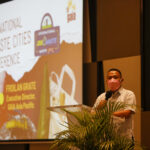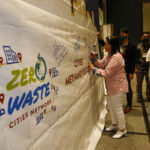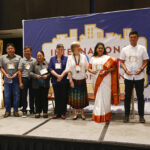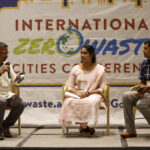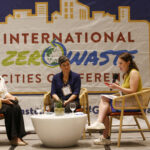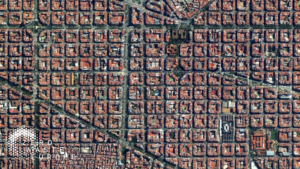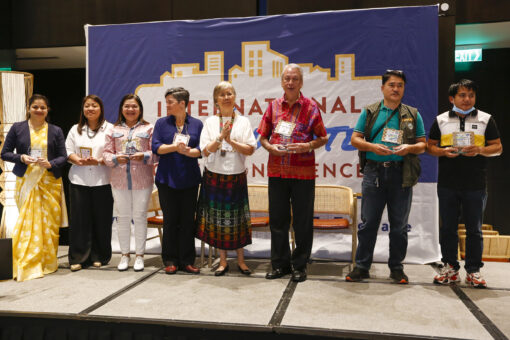
No social justice or just transition without the Global South – lessons from the International Zero Waste Cities Conference
Double standards
When it comes to general global public perceptions, there are clear double standards at play between the Global North and the Global South. And that is particularly visible when talking about the environment and social justice.
In most news circles and dominant narratives of the Northern hemisphere and Western World, the northern part of the world is often portrayed as the place where all the innovation, solutions, and impactful efforts happen. This is, at a minimum, misguided, given that the biggest world polluters are located in the Global North. However, Southern areas of the globe are often characterised as places which are lagging behind and whose people carry the onus of blame for global pollution.
As a prime example of this, consider the narrative that Asia Pacific countries were responsible for the bulk of global plastic pollution, which was massively amplified by the Stemming the Tide paper by US-based Ocean Conservancy in 2015. This perception and narrative endured for 7 years and caused disproportionate harm to that region of the world. Even though Ocean Conservancy retracted its position and publicly apologised for it in July 2022, the damage caused to, and lasting public perception of, South-East Asian countries will likely take as much time to undo.
The world, however, doesn’t progress without creating spaces for true open dialogue. As the Director of GAIA Asia Pacific, Froilan Grate, said when Ocean Conservancy’s apology was published, “The apology is an invitation to hear the voices and concerns of communities and groups in the Asia Pacific region who have been disproportionately impacted by this framing, and for whom this issue is very personal. This is a time for the rest of the world to listen and follow their lead.”
And that’s exactly what the 2023 International Zero Waste Cities Conference (IZWCC) set out to do.
Takeaways from the IZWCC 2023
On 26-27 January, zero waste champions from around the globe, policy-makers, and many groups came together at the IZWCC in Manila, Philippines. Organised by the Asia Pacific region of GAIA, and under the topic “Zero waste for zero emissions”, the event took a deeper look at the relationship between climate and waste. The discussions unpacked current challenges and potential solutions from around the world, with a special focus on those carried by groups and regions in the Global South.
As a first time participant to this conference, and as someone who personally had not had much on-the-ground contact with the zero waste efforts carried by Global South groups, I was very keen to hear first-hand accounts of their activities, achievements, and needs.
Environmental and social justice underlined the conversation of most sessions, but maybe none so as much the discussions and moments around wastepickers and grassroots community efforts towards zero waste.
1. No just transition without wastepickers
In the case of wastepickers (India) or wasteworkers (Asia Pacific countries), who are often part of groups who already face multiple discrimination instances, it was powerful to hear how this work allows them to provide for themselves and their families while contributing to the wellbeing of their community.
To further prove that point, the study visits to Material Recovery Facilities (MRFs) around the Philippines – some of them serving extremely low-income neighborhoods – showed the impact of this work at the most local of levels, delivering a safer, healthier, cleaner environment within their direct community. Wastepickers and wasteworkers are extremely proud of their work and of their contribution to a better society and future. And yet, while they are paid by their local government, they are not supported in the way they should be when it comes to benefits such as holidays, sick leave, formal representation and recognition in dialogue and decision-making spaces that have an impact in their lives.
With negotiations ongoing for a Global Plastics Treaty by the United Nations, it’s really easy to engage in the requests for all kinds of plastics to be eradicated all at once. Whatever the outcome of the negotiations, it’s crucial to treat wastepickers and wasteworkers like the waste management experts that they are. Wastepickers and wasterworkers are for the end of plastic pollution and the uptake of global zero waste solutions, and they must be involved in these discussions in a way that takes into account the impact on their livelihoods and guarantees their future. Only then we can talk about just transition and social justice goals being met.
2. Inspiring examples from the Global South
Throughout the two conference days, there were plenty of local level examples and best practices on zero waste showcased – from community composting in India, to MRFs located within schools in the Philippines as part of their early education and awareness efforts, to evidence from on-the-ground actions in Indonesia proving that zero waste is the best long-term investment when it comes to environmental and climate solutions.
While the focus and praise was put on communities as a whole, the female leaders of many of these efforts were not forgotten, culminating on the panel of Zero Waste Women Champions from the Asia Pacific region. You can learn more about their stories, achievements, and words of advice for zero waste communities around the world in GAIA’s “Vision and Grit” compendium.
Photos from the 2023 International Zero Waste Cities Conference in the Metro Manila area, Philippines. Photo credits: Global Alliance for Incinerator Alternatives (GAIA) – Asia Pacific.
It takes a community
This event, and in particular the activities around the Global South, reminded us all that zero waste is, at heart, a community-led effort. From the smallest community to the biggest municipalities, it takes collective action to put it in motion and change the way we produce, consume, and dispose of resources and materials.
In Europe, and the Global North in general, it is more challenging to see the sense of community and collective wellbeing that I observed in and sensed from Asia Pacific.
We tend to hide behind the high-tech solutions being pushed by the industry as silver bullets to pollution; and behind the centralisation of waste management solutions. In reality, far more can be achieved – and at a much more cost-effective rate – if, in addition to demanding better waste policies, we pool our efforts towards the low-tech, centuries-old solutions presented by zero waste, and which can be implemented by all of us.
Despite many harmful environmental narratives, communities in the Global South have not been defeated: they have rolled up their sleeves, joined efforts, and kept on contributing towards a zero waste future using their resources. And when the rest of the world tries to shut them out of impactful climate decisions, they speak up and ensure there is a seat at the table for them – and one that isn’t based on tokenisation.
The work done in Africa, Latin America, and Asia Pacific can inspire the Global North just as much as Northern regions can inspire the South. Equally, the way the Global North deals – or rather fails to deal – with its waste disproportionately affects other parts of the world. So many times we have been urged to stop treating the Global South as the Global North’s waste dumping ground, yet we continue to hear stories about legal and illegal waste exports to Africa, Asia Pacific and Latin America. Regardless of their legality (or lack thereof), both types endanger people’s health and the environment around them. And despite all of that, if this conference is any example, the Global South remains as open and welcoming as ever to shared learnings and experiences, extending a hand to cooperate on solutions for our common problems even after the most problematic of narratives.
It’s time to put the Global North hubris aside and debunk the narrative that we alone have what it takes to stop the waste and climate crises. Other global regions are neither to serve as a scapegoat nor just as a passenger to our activities. To save the planet and achieve social justice for all, we need to act with collective wellbeing and responsibility in mind, and act in solidarity with those most impacted by the climate crisis. This is the only way to ensure resilience and sufficiency for all, and to live within our planetary boundaries.
